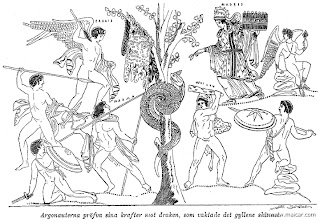"There is a maiden, nurtured in the halls of Aeetes, whom the goddess Hecate taught to handle magic herbs with exceeding skill …" (Argus 4 to the ARGONAUTS. Apollonius Rhodius, Argonautica 3.528).
"… nothing shall come between our love till the doom of death fold us round." (Jason to Medea. Apollonius Rhodius,Argonautica 3.1128). |
A Neopolitan vase depicting the triumph of Jason over the fiery bulls of
Aeetes at Colchis. Several other fine images of the Medea story, and much more iconography, can be found at
this page, part of the remarkable
Greek Mythology link from Carlos Parada and Maicar Forlag.
A complete translation of Euripides
Medea 431 BC) with notes by
is here. A few snippets (but from another translation):
Medea
For in other ways a woman
Is full of fear, defenseless, dreads the sight of cold
Steel; but, when once she is wronged in the matter of love,
No other soul can hold so many thoughts of blood. (265)
Medea Women, though most helpless in doing good deeds,
Are of every evil the cleverest of contrivers. (409)
Jason
Instead of living among barbarians,
You inhabit a Greek land and understand our ways,
How to live by law instead of the sweet will of force. (537)
The
Third Chorus begins on line 824 with praise of the wisdom of the children of
Erechtheus. At the end of Metamorphoses 6, we were reading of one of them,
Oreithyia (from the
Luschnig trans.):
Descendants of Erechtheus, wealthy of old
and children of the blessed gods,
from a land holy and unconquered, feeding
on most glorious wisdom always
stepping delicately through the brightest air,
there once they say the nine Muses of Pieria
gave birth to Golden Harmony.
They sing the tale that Kypris
drawing water at the streams of fair-flowing Kephisos
breathes gentle sweet-smelling
auras of winds over the land; and always putting
on her hair a fragrant garland of rose blossoms,
she sends the Loves, co-workers with wisdom,
helpers of every sort of excellence.

How then will the city of holy rivers,
the land that gives safe-passage
to friends,
welcome you, child-killer,
not holy with the others?
Picture the blow to the children;
picture the murder you are committing.
Do not, at your knees
in every way we beseech you,
do not kill your children.
Where will you get the boldness
of mind to confer upon your hand or heart,
that terrible daring?
And, how, when you cast your eyes
on the children will you take part
in their murder without weeping? No, you cannot
— when your children fall begging —
wet your hand in their blood
keeping an iron-willed heart
Final Chorus (The chorus files out with these lines):
Of many things Zeus in Olympus is keeper,
many are the things the gods bring about against all reason,
and what is looked for does not happen after all,
yet a god finds a way for the unexpected.
That is how this story has ended.








